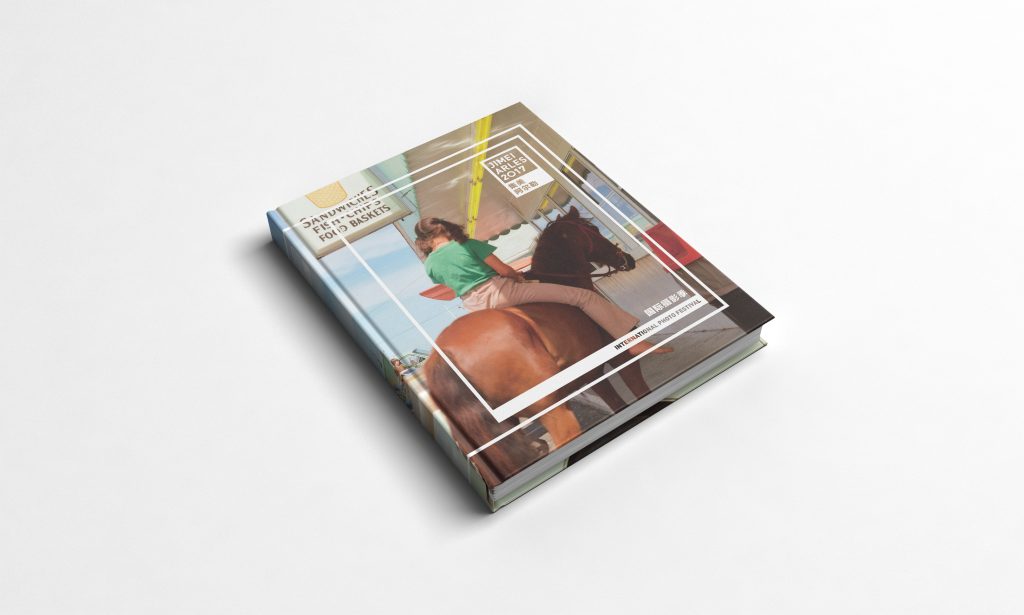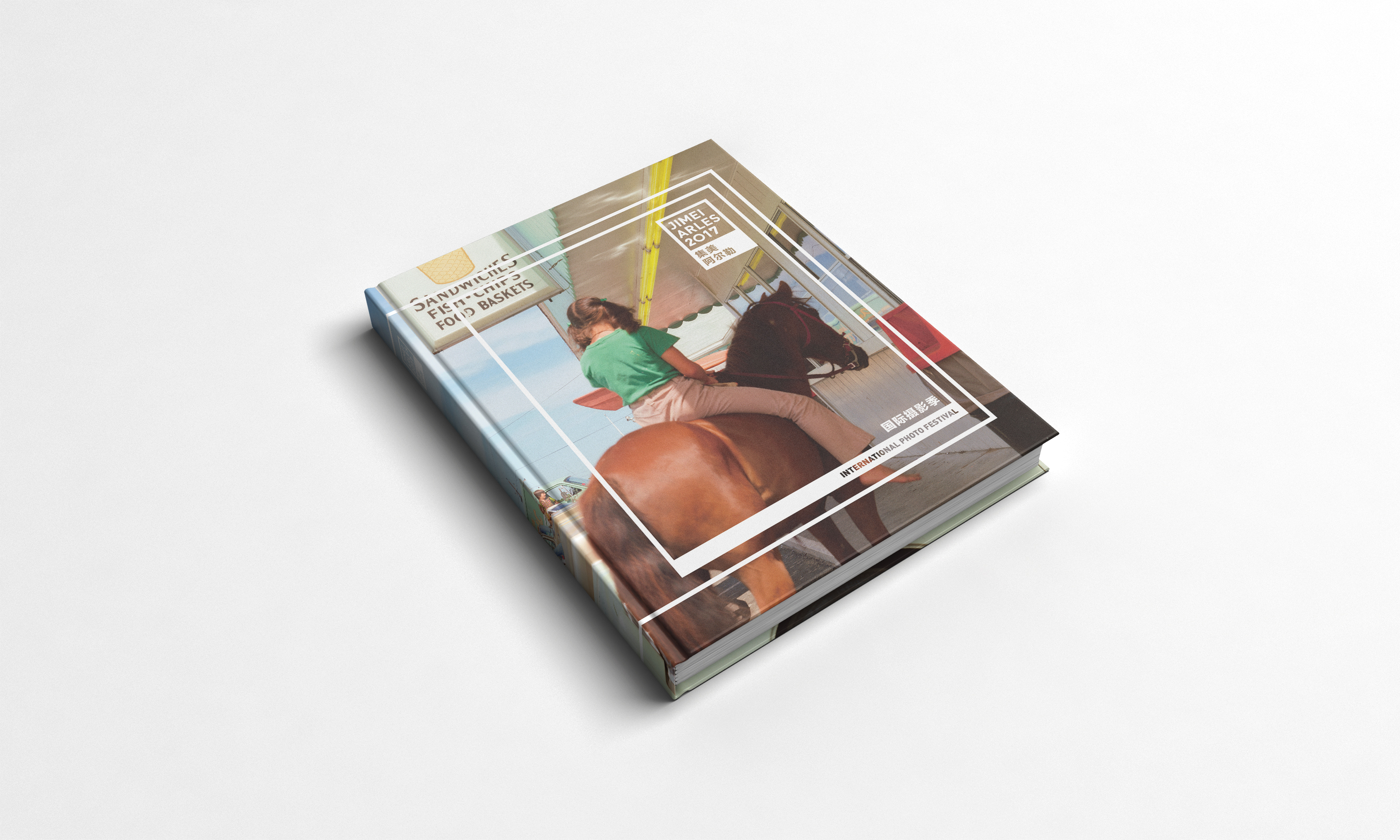
JIMEI ARLES 2017 International Photo Festival Catalogue
《2017集美阿尔勒国际摄影季》画册
On the Edge of the Abyss
Postmodern difference theory upholds the value of difference and diversity while rejecting the discourse of power as a result of homogeneity; since the 1970s, it has not only been seen as the cornerstone of cultural studies, but also been used and digested by artists all over the world, who have in turn transformed it into critical artistic practices, covering such complex and diverse themes as class, race, gender and cultural identity.
A red thread goes through a piece of paper that has been intentionally folded and unfolded, evoking a sense of fragility and pain that emanates from the creases and bleeds into the photographs based on the image—artist Guo Yingguang takes inspiration from Albrecht von Haller, who once said the skin “is regarded as a kind of medium isolating the external and the internal”, and combines this theory with visual practices, thereby representing the shared experience of private and public life through depictions of physical traces left on paper.
The Bliss of Conformity is a photography-based mixed-media series that combines elements of video, installation and artist’s book. In this work, Guo Yingguang explores arranged marriages in China and the emotionally-distant coexistence between arranged couples from both abstract and concrete viewpoints. Starting from her own individual experience and the contemporary social experience at large, Guo Yingguang combines documentary photography and creative artistic practices to create carefully constructed, highly contrasted visual structures that challenge stereotypical notions of women in a complex socio-cultural consciousness.
In response to her continued reflections on gender differences, Guo Yingguang chooses the matchmaking corner in People’s Park, Shanghai as her main creation field. In addition to photographing daily scenes and details of personal adds at the matchmaking corner, she also records her own experience with matchmaking through performance acts. In contrast to documentary photography, Guo uses photo-etching techniques to create a series of abstract images that reveal the turbulent truths of arranged marriages beneath the seemingly calm surface depicted by peaceful images of the park, such as traditional intergenerational relationships and views of marriage, as well as discrimination against the so-called “left-over women”. At the same time, Guo’s artist’s book is created in a global context, aiming to construct multi-layered interconnections between time and space and to express emotions through compositional arrangements. By the use of these artistic practices, the artist is able to explore the problems faced by educated women as individuals in the reality of the contemporary Chinese society, revealing a feminist’s conflicting standpoint under the influences of traditional ethics, politico-economic social transitions and individual life experiences.
While Guo Yingguang’s work is mainly concerned with problems of arranged marriages in China, artist Jiang Yuxin chooses to focus on the issue of identity differences. A graduate of the University of Westminster with a MA in Photographic Studies, Jiang follows in the footsteps of British photography theorist Victor Burgin in his interests in image and intertextuality and the way he integrates postmodern theories into photographic practices. Jiang is especially good at combining images, objects and texts in real-life arrangements. Her work is based on a tremendous amount of research in the fields of psychoanalysis and postmodern cultural studies, and it encourages viewers to activate artworks through their own readings and to reconsider the meaning of familiar concepts found in everyday life.
Jiang Yuxin’s latest work, 3 Encounters, 7 Buildings, and 2500 Grains of Rice, is inspired by her own encounters with identity differences while studying abroad in London. The minute and subtle details ingrained in everyday conversations and life experiences moved her to question the stereotypical differentiation of identities through nationalization. From the intercultural “Chinese” objects and product images the artist has encountered while living abroad , to the section planes of various Chinese establishments hidden in the streets of London, and finally to the materials derived from instances of embarrassment or being ignored as a result of identity differences, Jiang turns covert mental activities into complex visual representations through a combination of still photos, videos and installations, which enables her to speak up unreservedly about her repeated reflections on the issues stated above.
Both Guo Yingguang and Jiang Xinyu have chosen to use their own experience as the starting point of their creative works, which reveals the way contemporary artists explore issues concerning the society and everyday life and their ability to think critically. Their works reflect the tendencies of today’s practitioners of art to work within the frame of contemporary art theories, and their experience abroad has given them the vantage point of working in a global context and the potential to expand on existing methodologies. Although they have used different visual strategies and organizational methods in their works, both Guo and Jiang have differed from the traditional photographic practice, and their works are manifestations of their explorations with complex artistic structures and their efforts to integrate logic, content and form.
如临深渊
文/何伊宁
后现代差异理论主张差异和多元、反对同一性所构成的权力话语,从上世纪70年代以来不单单作为文化研究的基石,同时被全世界的当代艺术家们加以利用,吸收并转化成极具批判性的艺术实践,内容所及涵盖了包括阶级、种族、性别和文化身份认同等复杂多样的主题。
一根红线穿过被刻意折叠过的纸上,脆弱和刺痛感从纸张的褶皱处延伸到艺术家据此翻拍的图像之上,创作者郭盈光从阿尔布莱克·冯·哈勒(Albrecht von Haller)——“皮肤被看作是隔离外在与内在的媒介”——所阐述的皮肤理论中得到灵感,将其和视觉创作结合起来,尝试通过对纸表面的物理痕迹的描写去体现私人和公众生活的共同经历。
《顺从的幸福》是一组以摄影为主要创作媒介、结合录像、装置和艺术家书组成的综合媒介作品,郭盈光从虚实两个方面探讨了中国式的安排婚姻以及被安排婚姻夫妻之间的非亲密状态。在创作过程中,郭盈光从自身与当下社会生活的交点出发,将纪实摄影和艺术创作手法融合,尝试用精心建构的、具有强烈对比的作品结构来挑战人们对女性身份在复杂社会和文化认知中的固有认同。
为了回应艺术家对性别差异性的持续思考,郭盈光将作品切入点锚定在现实中的上海人民公园的相亲角,在拍摄一系列相亲角日常的环境肖像以及相亲广告细节的同时,她通过行为表演的方式用录像纪录下她在相亲过程中所遭遇的现状。与纪实图像形成对比的,是一组经过艺术家抽象化的照相蚀刻法(photo etching)照片,在那些人民公园自然风景照片中看似恬静地表面之下,是中国式安排婚姻所体现出的传统代际关系、婚姻观念以及对剩女的歧视,无不透露出一种讽刺和矛盾性。与此同时,郭盈光将艺术书的创作立足于全球化语境中,尝试在编排中建立起时间、空间等多层关系以及情感的表达。艺术家正是选择通过以上实践,探讨了作为个体的知识女性在中国现实情境中所遇到的问题,体现了一位女性主义者在面对中国传统的伦理观念、中国社会政治经济转型以及个体生命体验时所产生的复杂矛盾立场。
在郭盈光向中国式安排婚姻发起质疑的同时,旅英摄影艺术家姜宇欣则将问题投射到身份差异的问题之上。姜宇欣,毕业于英国威斯敏斯特大学摄影研究专业,在实践中沿袭了英国摄影理论奠基人维克多·布尔津(Victor Burgin)对图像和文字互文性的兴趣,以及他将后现代理论带入摄影实践的方法。姜宇欣擅长通过将现实场景中编导的图像,静物和文本结合起来,力图在观者对文字的阅读和思考过程中激活作品,激起对于日常生活中熟悉概念的重新思考,涉及大量的心理分析学、后现代文化理论的研究。
姜宇欣最新作品《3次相遇,7幢楼,2500粒米》的创作初衷来源于她在伦敦学习和生活过程中所遇到的身份差异问题,那些细枝末节的日常对话和遭遇使她对固化的以国别划分的身份认同和差异问题产生质疑。从艺术家在留学生活中所接触到的,具有混合文化认知的“中国”物件和商品图像;到隐藏在伦敦街头,具有不同类型表征的中国机构建筑剖面;再到她将自己在日常遭遇的,因身份差异所引起的尴尬和无视所提炼出的材料,该作品通过静态照片、影像和装置的组合将隐秘的思维活动转变为复杂的视觉作品,向观众毫无保留地展现出她对上述问题的反复思考。
无论是郭盈光试图探讨中国式安排婚姻的《顺从的幸福》,还是姜宇欣反思固化身份认同和差异性问题的《3次相遇,7幢楼,2500粒米》,两人都选择从自身经历出发,展现出当代艺术家讨论围绕社会和日常问题以及批判性思考的能力;她们的作品均反映出当代艺术实践者在当代艺术理论框架下进行创作的倾向,其西方学习的经验赋予了她们在全球化背景下进行创作的视野,以及在拓展方法论上的可能性。虽然两人作品中运用了不同的视觉策略和组织方式,但区别于传统的摄影实践,郭盈光和姜宇欣的作品纷纷体现出对复杂作品结构进行探索的尝试,以及在保持逻辑性,内容和形式统一上所做的努力。

Reply